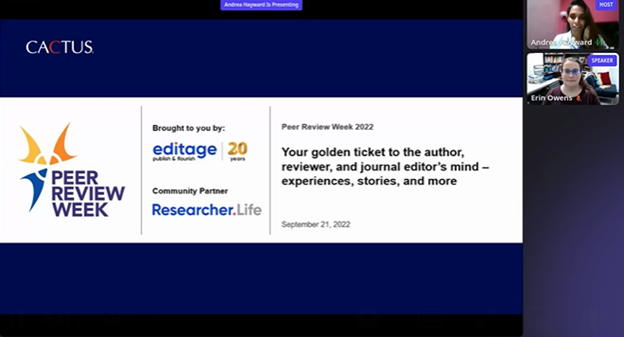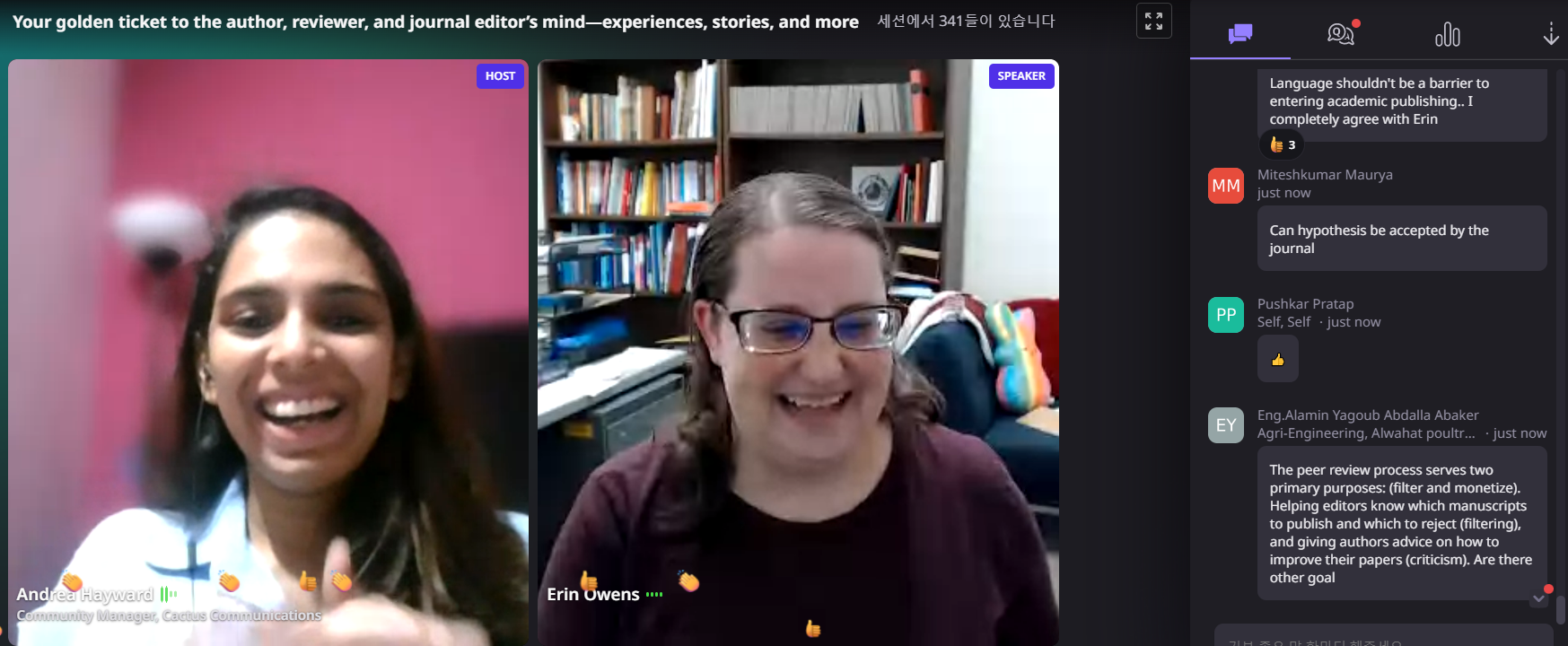Highlights from Peer Review Week 2022 Day 2: Experiences and stories from the perspective of the author, reviewer, and journal editor shared by Erin Owens

Often, we forget to shine the light on the people behind complex publishing processes. On Day 2(Sep 21) of the Peer Review Week 2022 celebrations (Sep 19-23), powered by Editage and Researcher.Life, we hosted a panel discussion: “Your golden ticket to the author, reviewer, and journal editor’s mind—experiences, stories, and more” to understand the personal, emotional, and human side of navigating the peer review process. Conversation flowed seamlessly between Erin Owens, Professor, Access Services Coordinator & Scholarly Communications Librarian, Newton Gresham Library, Sam Houston State University, and Andrea Hayward, Community Manager at Cactus Communications. A prolific author and reviewer, Erin has also been the editor of a journal for the past year, and could therefore share her experience with the peer review process from all the three different perspectives. In case you missed the insightful discussion, we have you covered! This post shares some of the highlights of the session.

The discussion, focused on exploring the human side of peer review, started with a trip down memory lane to Erin’s first peer review experience as an author, specifically, the emotions she had felt back then. Erin very clearly recalled the feelings of anxiety, self-doubt, and fear around the outcome of peer review as well as the stressfully long wait from submission to outcome. She also fondly remembered the feeling of validation when she received positive feedback from her peer reviewers.
When asked how reviewer comments generally affect her as an author and how she deals with them, Erin admitted that even 15 years after her first submission, she still continues to feel very strong initial emotional responses when she reads negative comments on her papers. However, what has changed for her through the years is learning to step back, detach herself and look at it from a reviewer’s perspective rather than an author’s.
Erin’s advice to first time peer reviewers was to imagine the author at the other end when writing their comments and remind themselves explicitly to not make it personal – it is the work they are critiquing and not the author. She also emphasized the need for authors to understand that reviewer comments are just suggestions and as authors, they have the option to agree partially or even disagree to comments - she urged authors “to take some of the power back” and to remember that at the end of the day, peer review is a conversation between the author, the reviewer, and the editor.
Moving on to Erin’s first experience as a peer reviewer, Andrea wanted to know what it felt like to give strong feedback to someone else. Erin shared that she had feelings of self-doubt and questioned her credentials and capability to review another author’s work. She also felt anxiety about hurting someone else’s feelings while at the same time wanting to give honest feedback and making sure the best science makes its way to the literature. According to Erin, “It’s really about finding that balance between being honest and being constructive and not being hurtful at all.”
When asked about the editor’s role about being the mediator between the author and reviewer, Erin feels that it is important to reduce hurt, be honest with the author and help them and navigate tricky situations in peer review. She explained how as an editor, she consciously summarizes harsh comments from reviewers in her own words so that they are not hurtful for the author, and in case of conflicting reviewer comments, provides her suggestions or guidance as to which comment the author should go with. When rejecting a paper, she also gives constructive feedback “to make it a learning and growing process for the author and give them that space to improve and submit their paper to the same or to another journal.”

The conversation gradually moved to how the nature of the publication system makes it difficult sometimes for the reviewer and editor to be empathetic, particularly as their work can often be voluntary and time consuming. What according to Erin helps her in those moments is to remember that many of the authors may not be experienced and that the system is as lengthy and frustrating for them. This helps her ensure that she is as respectful as possible in her feedback.
When asked to what extent can changes in the academic culture can help alleviate the anxiety involved in the peer review process for all parties concerned, Erin pointed out that “training researchers on how to become peer reviewers and how to form constructive criticism and how to bring empathy into the process can go a long way to creating the kind of peer review system we would like to participate in.” Erin also recommended having guidelines around quality as opposed to quantity when it comes to publication so that authors don’t feel pressured to publish more, as well as having a system of recognition in place for peer reviewers. This might help alleviate anxiety and bring more empathy into the peer review process.
We have some more exciting events lined up for the rest of the days. For the details of the upcoming sessions and to register for them, sign up right now!
Comments
You're looking to give wings to your academic career and publication journey. We like that!
Why don't we give you complete access! Create a free account and get unlimited access to all resources & a vibrant researcher community.

Subscribe to Journal Submission & Peer Review













